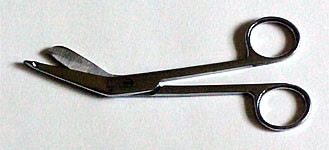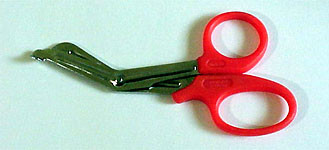Bondage Techniques
by Dr. Bondage
"Bondage: Good for what ails you!"
Italiano Dott. Bondage: scatto qui
Safety First
Like any other sport or hobby, bondage is best practiced with an awareness of safety. If the game is played right, every participant wins!
In all sports, there is the possibility of accidents, so here are some recommended "don'ts" for bondage. Don't play when you're not alert. Don't play when
tired or under the influence of drugs or alcohol. Don't try things you aren't sure about. The front of the neck should never receive pressure of any kind. Don't leave
a bound person alone.
The Two Ways limbs "fall asleep"
-
Circulation
Poorly done bondage, particularly at the wrists or ankles, will inhibit circulation. The sub will feel a numbness or slight tingling. Sometimes it will feel
uncomfortable, sometimes not. (We've all had the experience of having a foot fall asleep.) Temporary inhibition of circulation is not a problem unless the sub
is feeling pain. Ask the sub whether they want the bondage adjusted or removed. Their decision is law.
-
Nerve endings
If bondage is pinching nerve paths, the sub will feel shooting pains or focused pain. Never interfere with nerve paths. If the sub believes the bondage is blocking
a nerve path, remove the bondage immediately.
Binding the wrists behind the back pulls breathing muscles taut. For captives lacking flexibility, the reduced supply of oxygen can cause headaches or fainting. Be
alert to the captive's physical limitations and reactions.
Time Limits
Healthy participants can enjoy a position for about an hour. If you're not in prime health, try about a half hour for any given position. If you're trying something
new, limit the first exposure to a half hour.
To prolong your bondage sessions, vary hand placement -- for example, start with hands behind, then after a half hour, switch to a hands-front position, etc.
Safewords
A Safeword is a word, sound or action that is used to communicate during a scene. If you are not playing "roles" during a scene, you can just tell eachother
when you want something, but if you're gagged or "in role," communication can be more difficult. Common Safe words are "red," "mercy," the
word "safe word," or humming a specific tune. Safe word actions can be things like snapping your fingers, raising your foot, or dropping car keys from your hand.
Quick Release
Safety scissors (medical scissors) can be purchased at pharmacies. Designed for removing bandages, the scissors have a flat outer side to protect skin when cutting binds.
These are perfect for completing saran-wrap scenes.

If you use thick bondage equipment such as leather or fat ropes, keep industrial scissors or EMT scissors on hand too.

ANY QUESTIONS?
"We have some friends who are really into noose play. I have heard that this is extremely dangerous, but also extremely arousing. What are your views on the use
of nooses, and is there any way they can be used safely?"
There isn't any way to use them safely. Even gentle pressure on the side or front of the neck can reduce oxygen to the brain.
Most bondage injuries are not suffered by beginners. Rather, most bondage injuries are caused by experienced players who have progressed in their techniques, consider
themselves "experts" who can try risky things, and have become overconfident. So beware...!
"I sometimes practice self-bondage, but I can never fully restrain myself. Do you have any cheap solutions that would help me fully restrain myself."
I receive a lot of questions on this topic.
Police reports indicate that several people die every year from self-bondage. The most common cause is the wrists get overly trapped (the planned escape technique
fails) and the player eventually chokes to death on their gag.
So, I don't volunteer any ideas on self-tying. Not that I'm opposed to people roping their legs and tying on crotch ropes. It's just that, if you plan to secure
your hands or wrists in any way, do it only when someone is in the room with you.
|



